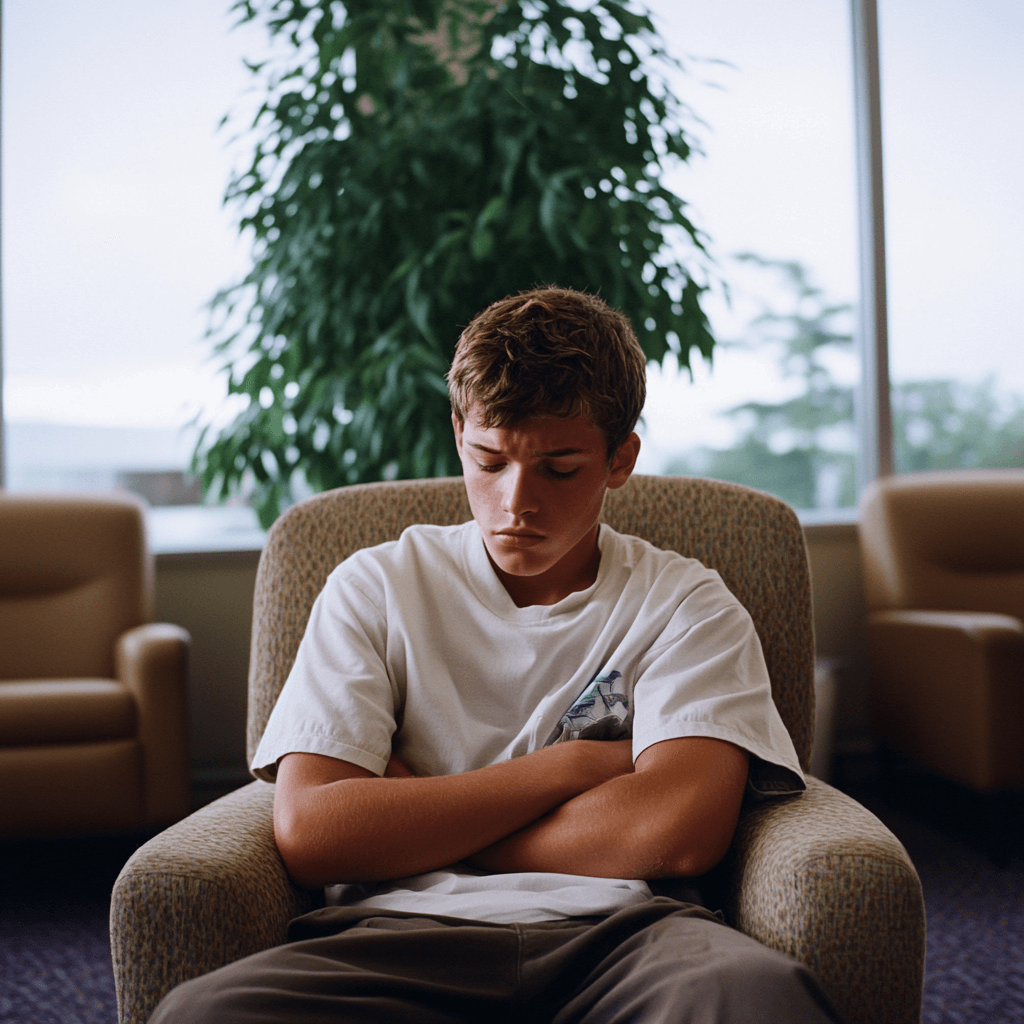If you are suffering from depression and anxiety, your first step towards effective rehab for depression and anxiety is understanding the everyday symptoms, misconceptions, and the most effective treatment therapies available.
Depression is More Than Just a Feeling
Depression is far more than just feeling sad. It is a persistent unhappiness, lack of interest, and a solid indifference to general activity. When depression is left unchecked, the disorder often leads to severe harmful changes in appetite, loss of sleep, and, more critically, suicidal tendencies.
Depression does not strictly occur in adults. Approximately 4.1 million adolescents between the ages of 12 and 17 have reported depression-related symptoms in the United States alone. Globally, depression affects over 300 million people worldwide.
Types of Depression
One of the most commonly diagnosed types of depression is Major Depressive Disorder – or MDD for short. Major Depressive Disorder is characterized by a perpetual sense of sadness and lack of activity spanning two weeks or longer, with the following symptoms persisting into everyday social, work, and educational functions:
- Sleep disturbances, including difficulty sleeping or sleeping too much.
- A drastic increase or decrease in appetite,
- Physical agitation or slowing down of movement,
- Constant feelings of low self-worth or undue guilt,
- Persistent tiredness,
- Difficulty in cognitive processes, such as thinking, concentrating, or making decisions.
- Frequent thoughts about death, including suicidal thoughts, with or without specific plans,
If chronic feelings of sad, low, or dark mood persist for two years or longer for large parts of the day, then the individual may have Dysthymia or Persistent Depressive Disorder. Two of the above diagnostic symptoms associated with MDD should also be present to receive a proper diagnosis of dysthymia, with symptom-free periods lasting two months or less. Symptoms must be ongoing for at least one year for children and adolescents. Persistent depressive disorder is not as severe as major depressive disorder, and MDD may occur before dysthymia.

Individuals with smiling depression often look happy to the outside world and keep their depression a secret.
Another severe form of depression is Premenstrual Dysphoric Disorder (PMDD), a common depression often associated with premenstrual syndrome (PMS) in the weeks leading up to a woman’s period cycle. Symptoms of PMDD not only include the psychological aspects of MDD, but some of the following physical symptoms as well:
- Headaches
- Dizziness
- Cramps
- Gas Build Up
- Infrequent Bowl Movements
- Uneasiness in Stomach, Urge to Vomit.
- Vomiting
- Chronic Pelvic and Back Pain or Pressure
- Skin Acne, Inflammation, or Itching
Please consult with a certified doctor for the most accurate diagnosis.

Skip To:
Learn More:
- Depression and Marijuana. Is Marijuana A Depressant? Does Marijuana Help Depression?
- Severe Depression Treatment, Causes, & Symptoms
- Inpatient Depression Treatment
- 101 Depression Quotes to Help You Feel Less Alone. Depressing Quotes.
- How Long Does Postpartum Depression Last?
- Postpartum Depression Symptoms & Causes
- How Alcohol and Depression are Linked? Abuse Signs & Causes
- Bipolar Depression Symptoms, Causes, Effects, and Treatment
- 10 Signs You May Have Smiling Depression
- Depression Treatment, Understanding the Symptoms & Causes
What About Anxiety?
Similar to depression disorder, anxiety disorders are more than just temporary, fleeting worries or fears. Instead, anxiety is the excessive and persistent feelings of nervousness and panic, with the sense of impending doom. Such emotions can feel so overwhelming that they become defeating to the individual if not professionally treated. Symptoms can also worsen physically, including insomnia, digestive problems, and a weakened immune system.
Anxiety is prevalent in both children and adults. An estimated 31.9% of adolescents between 13 and 18 years old experience a form of anxiety disorder in the United States, while adults with anxiety make up 19.9% of the population.
Types of Anxiety Disorders
Generalized Anxiety Disorder (GAD) is often associated with having a neurotic sense of personality or a constant worrisome attitude toward everyday life. People with GAD have trouble not being able to worry about issues relating to their occupational, social, or financial status, as well as any other topics that deeply concern them. Common symptoms of GAD include:
- Trouble falling or sleeping usually.
- On alert constantly or unable to be relaxed.
- Easily tired.
- Having problems focusing on tasks.
- The tendency to be easily annoyed.
- Muscle pain.
A Panic Disorder is the sudden outbreak of panic attacks and the fear of repeated attacks. Panic attacks affect approximately 2.7% of adults in the United States and are more likely to develop in individuals with anxiety or in an anxious mood. Panic attacks also begin with the following symptoms:
- Racing heartbeat.
- Perspiration.
- Light winded.
- Shaking.
- Dizzyness.
- Chest Pain.
- Urges to Vomit.
- Numbness or tingling sensations in the hands or face.
The second most diagnosed anxiety disorder, after a specific phobia, is SAD or Social Anxiety Disorder. Social anxiety disorder is the immense fear of being judged or watched by others in any public setting. SAD typically begins in the early teenage years and develops through adulthood.
Many individuals diagnosed with social anxiety disorder experience some of the same physical symptoms as panic attacks, such as rapid heart palpitations, nausea, sweating, prickling sensations on the fingertips and cheeks, as well as heavy breathing.
If you regularly experience symptoms relating to an anxiety disorder, consult with a medical professional before seeking treatment.
Unpacking Common Misconceptions vs. Truths About Rehab For Depression and Anxiety
Myth 1 – Rehab Is Only for the Most Severe of Depression and Anxiety
Fact: No matter the extremity, there are various rehab programs for different levels of depression and anxiety. Early intervention is essential, however, and anyone feeling their symptoms worsening must seek professional help.
Myth 2 – Rehabilitation for Depression and Anxiety Is Only a Quick Band-Aid For a Long Term Issue.
Fact: A successful rehabilitation program is not just a quick fix to a lifelong issue but a personal journey in understanding the underlying causes of depression and anxiety that ensures all patients develop the strategies necessary for long-term personal care.
Myth 3 – Rehab Centers Over-Prescribe in Medication for Depression and Anxiety
Fact: Although medication can be part of a specific treatment plan, an effective rehab program for depression and anxiety focuses on generating a well-balanced approach. This can often include lifestyle changes, therapy, and holistic treatment options instead of strictly medicinal care.
Myth 4 – You Lose Your Independence in Rehab for Depression and Anxiety
Fact: The goal of rehabilitation programs is to empower individuals to regain control of their mental health and lives. Inpatient programs, for instance, have structured environments but are designed to foster at-home independence within a supportive community.
Myth 5 – Rehab for Depression and Anxiety Isolates You In a Bubble
Fact: Many rehab programs and facilities encourage an immense supportive hub to maintain your daily social, physical, and occupational routine while undergoing treatment. Family visitations are integrated into inpatient care treatment as well.
Myth 6 – Lack of Therapeutic Variety in Rehab for Depression and Anxiety
Fact: Every rehabilitation program depends on each patient’s circumstances, but most therapy done in rehab centers uses different approaches. Cognitive and dialectical behavioral therapy, group therapy, and individual therapy, for example, are just some of the methods utilized in rehab for depression and anxiety.
Myth 7 – Treatment for Anxiety and Depression in Rehab Do Not Address Its Rudimentary Causes
Fact: Any form of rehabilitation plan aims to understand each patient’s unique story and background, as well as to highlight the origins of depression and anxiety through their personal history. Once identified, a comprehensive treatment strategy is discussed and then applied.
Myth 8 – No Support After Rehab for Depression and Anxiety
Fact: The post-rehabilitation support is one of the most crucial steps of any treatment plan. Many rehab facilities will follow up with patients by scheduling progress therapy sessions, support groups, and other resources to sustain long-term management of depression and anxiety.
Myth 9 – Rehab Facilities Feel Too Clinical and Cold for Effective Care of Depression and Anxiety
Fact: In today’s rehabilitation environment, facilities are warm and welcoming, with amenities that resemble a home-like atmosphere to treat depression and anxiety. The essential goal, nevertheless, is to create a safe space of healing and comfort for all inpatients or outpatients.
Myth 10 – Entering Rehab for Depression and Anxiety is a Sign of Weakness
Fact: One of the leading causes of not seeking rehab for depression and anxiety is due to being seen as weak or fragile. On the contrary, choosing to attend rehab for depression and anxiety is a courageous step towards better mental health and shows immense strength and commitment to securing a better future.
Get Help. Get Better. Get Your Life Back.
Searching for Accredited Drug and Alcohol Rehab Centers Near You? We Level Up Texas Is Ready To Help!
Even if you have failed previously and relapsed, or are in the middle of a difficult crisis, we stand ready to support you. Our trusted behavioral health specialists will not give up on you. When you feel ready or just want someone to speak to about therapy alternatives to change your life call us. Even if we cannot assist you, we will lead you to wherever you can get support. There is no obligation. Call our network hotline today.
FREE Addiction Hotline – Call 24/7Treatment Approaches in Rehab for Depression and Anxiety
When it comes to rehabilitation for depression and anxiety, a personalized approach is crucial. Each individual’s journey is unique, and rehab clinics for depression and anxiety are well-equipped to address this diversity with tailored treatment plans.
Diverse Therapeutic Modalities: Rehab for depression and anxiety often involves a variety of therapeutic techniques. This can range from Cognitive Behavioral Therapy (CBT) for restructuring negative thought patterns to Dialectical Behavior Therapy (DBT) for managing intense emotions. Each method is selected based on its suitability to the individual’s symptoms and history.
Holistic and Alternative Therapies: Many rehab centers for depression and anxiety near you may also offer holistic therapies. These can include mindfulness meditation, art therapy, or yoga, providing a comprehensive approach to treatment that addresses both the mind and body.
Focused Medication Management: For those in inpatient rehab for anxiety and depression, medication management is a critical component. Psychiatrists carefully tailor medication plans to suit individual needs, continually monitoring and adjusting as necessary to ensure the most effective treatment with minimal side effects.
Lifestyle Interventions: Understanding that recovery extends beyond the therapy room, rehabs for depression and anxiety often incorporate lifestyle education. This can include nutritional counseling, physical activity programs, and stress management techniques, emphasizing the role of a healthy lifestyle in managing mental health.
Family and Community Support: Rehabilitation doesn’t occur in isolation. Rehab facilities for depression often involve family members in the recovery process, recognizing the vital role they play. Family therapy sessions and educational workshops help create a supportive home environment crucial for long-term recovery.

Get Your Life Back
Find Hope & Recovery. Get Safe Comfortable Detox, Addiction Rehab & Dual Diagnosis High-Quality Care.
FREE Addiction Hotline – Call 24/7Navigating Professional Help for Rehab for Depression and Anxiety
Navigating professional help for depression and anxiety is one of the critical steps of the rehabilitation journey. It involves understanding the landscape of mental health services, actively seeking the right professional, and engaging in a collaborative treatment process.
Identifying the Right Professional
It’s essential to understand the different types of mental health professionals – psychiatrists, psychologists, therapists, counselors – and their areas of expertise. Researching and identifying the right professional based on your needs is a crucial first step.
Consulting Your Primary Care Physician
Often, your primary care doctor can be a starting point. They can provide an initial evaluation and refer you to appropriate mental health professionals.
Understanding Therapy Options
Familiarize yourself with various therapy approaches, like cognitive-behavioral therapy (CBT), dialectical behavior therapy (DBT), or interpersonal therapy. Knowing about these can help in discussions with professionals what approach might be best for you.
Insurance and Cost Considerations
Investigate what mental health services your insurance covers. If uninsured or underinsured, consider sliding scale fee options or community mental health centers offering affordable services.
Scheduling and Preparing for Appointments
Once you’ve chosen a professional, schedule an appointment. Prepare by noting down your symptoms, concerns, and any questions you might have to make the most of the session.
Building a Trusting Relationship
Open, honest communication is vital in therapy. Building a trusting relationship with your mental health professional allows more effective treatment.
Being Open to Medication
Please discuss the options, benefits, and potential side effects with your health professional if medication is necessary. Generally, finding the proper medication involves trial and error.
Long-term Engagement and Follow-up
Mental health treatment is often a long-term journey. Regularly assess your progress with your provider and make adjustments as needed.
First-Class Facilities & Amenities
World-Class High-Quality Addiction & Mental Health Rehabilitation Treatment
Rehab Centers TourRenowned Addiction Centers. Serene Private Facilities. Inpatient Rehab Programs Vary.
FREE Addiction Hotline – Call 24/7Proven recovery success experience, backed by a Team with History of:
15+
Years of Unified Experience
100s
5-Star Reviews Across Our Centers
10K
Recovery Success Stories Across Our Network
- Low Patient to Therapist Ratio
- Onsite Medical Detox Center
- Comprehensive Dual-Diagnosis Treatment
- Complimentary Family & Alumni Programs
- Coaching, Recovery & Personal Development Events
Popular Depression Rehab FAQs
Can you go to rehab for depression?
Yes, patients can receive dedicated treatment at professional rehab clinics for depression. We Level Up’s depression rehab centers offer clinically trained, licensed, and accredited facilities to help you recover from depression and other mental health conditions.
How long do you stay in rehab for depression?
Generally, for severe cases, a rehab for depression and anxiety program will provide intensive inpatient therapy geared toward long-term recovery. Inpatient programs are typically about a month long but can vary. Call the We Level Up depression rehab centers to learn more.
We Level Up Depression Rehab Centers
At the We Level Up Mental Health Treatment Center, we strive to provide comprehensive mental illness treatment programs specifically tailored to address the complexities of depression, as this disorder manifests differently in each individual.
Is there rehab for depression treatment? We Level Up offers depression therapies designed for long-term recovery. If you are looking for depression rehab centers near me, we may be able to help. Our specialized treatment options for depression include residential programs carefully designed to meet the unique needs of each patient, maximizing their chances of long-term success. Within our residential mental health programs, patients will have the opportunity to engage in a diverse range of therapies and programs aimed at exploring their depression and uncovering its underlying causes.
Generally, among the therapy programs offered at our inpatient rehab for depression are art and music therapy, biofeedback therapy, cognitive-behavioral therapy, dialectical behavior therapy, motivational interviewing, reality therapy program, solution-focused therapy, and more. These therapies provide patients with valuable tools and techniques to address their depression effectively.
In addition to one-on-one therapy sessions, patients at our depression rehab center can also benefit from group therapy sessions, where they have the opportunity to engage with and learn from others in the mental health recovery community, sharing their stories and experiences. This collective support helps foster a sense of camaraderie and mutual understanding.
Recognizing that therapy alone may not be sufficient for everyone, our approach to depression treatment encompasses comprehensive healing that addresses the patient as a whole. We incorporate evidence-based and holistic methods, including yoga, meditation, art therapy, music therapy, and equine therapy. This facilitates a more profound sense of healing to promote long-term progress and improvement. Additionally, health professionals may prescribe medication to complement the therapeutic approach.
It is common for individuals battling depression to develop a co-occurring disorder or dual diagnosis involving substance abuse, as drugs or alcohol may become unhealthy coping mechanisms. To address this overlapping issue, we offer dual diagnosis treatment, assisting patients in overcoming substance abuse while also managing their mental health needs and discovering healthier coping strategies. We understand that depression can be debilitating, but we firmly believe in empowering individuals to reclaim control over their lives.
How long do you stay in rehab for depression? At the We Level Up depression rehab center, patients typically stay up to one month. Call us for a free rehab for anxiety and depression assessment and related resources.
Professional Depression Rehab Center Evaluation
If you or a loved one feels the effects of depression, a professional depression rehab center like We Level Up Texas Treatment Center can help. Call for a free evaluation and learn more about how long you stay in rehab for depression and what sort of therapies are available to help you recover.
Watch the Ultimate Depression Treatment Methods Video
Learn about CBT and Mindfulness treatment for depression. Understand effective evidence-based therapies for depression.
Start a New Life
Begin with a free call to an addiction & behavioral health treatment advisor. Learn more about our dual-diagnosis programs. The We Level Up treatment center network delivers recovery programs that vary by each treatment facility. Call to learn more.
- Personalized Care
- Caring Accountable Staff
- World-class Amenities
- Licensed & Accredited
- Renowned w/ 100s 5-Star Reviews
We’ll Call You








